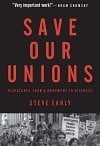Political Economy

John Bellamy Foster is a leading exponent of the theoretical perspective that continues in the tradition of Baran and Sweezy’s Monopoly Capital. This new edition of his essential work, The Theory of Monopoly Capitalism, is a clear and accessible explication of this outlook, brought up to the present, and incorporating an analysis of recently discovered “lost” chapters from Monopoly Capital and correspondence between Baran and Sweezy. It also discusses Magdoff and Sweezy’s analysis of the financialization of the economy in the 1970s, ’80s, and ’90s, leading up to the Great Financial Crisis of the opening decade of this century. | more…
Three years ago, in December 2006, I wrote an article for Monthly Review entitled “Monopoly-Finance Capital.” The occasion was the anniversary of Paul Baran and Paul Sweezy’s Monopoly Capital, published four decades earlier in 1966.…The article…[discussed] “the dual reality” of stagnant growth (or stagnation) and financialization, characterizing the advanced economies in this phase of capitalism. I concluded that this pointed to two possibilities: (1) a major financial and economic crisis in the form of “global debt meltdown and debt-deflation,” and (2) a prolongation of the symbiotic stagnation-financialization relationship of monopoly-finance capital. In fact, what we have experienced in the last two years, I would argue, is each of these sequentially: the worst financial-economic crisis since the 1930s, and then the system endeavoring to right itself by returning to financialization as its normal means of countering stagnation. It is thus doubly clear today that we are in a new phase of capitalism. In what follows, I shall attempt to outline the logic of this argument, as it evolved out of the work of Baran, Sweezy, and Harry Magdoff in particular, and how it relates to our present economic and social predicament. | more…
It is now universally recognized within science that humanity is confronting the prospect—if we do not soon change course—of a planetary ecological collapse. Not only is the global ecological crisis becoming more and more severe, with the time in which to address it fast running out, but the dominant environmental strategies are also forms of denial, demonstrably doomed to fail, judging by their own limited objectives. This tragic failure, I will argue, can be attributed to the refusal of the powers that be to address the roots of the ecological problem in capitalist production and the resulting necessity of ecological and social revolution. | more…
Today orthodox economics is reputedly being harnessed to an entirely new end: saving the planet from the ecological destruction wrought by capitalist expansion. It promises to accomplish this through the further expansion of capitalism itself, cleared of its excesses and excrescences. A growing army of self-styled “sustainable developers” argues that there is no contradiction between the unlimited accumulation of capital—the credo of economic liberalism from Adam Smith to the present—and the preservation of the earth. The system can continue to expand by creating a new “sustainable capitalism,” bringing the efficiency of the market to bear on nature and its reproduction. In reality, these visions amount to little more than a renewed strategy for profiting on planetary destruction. | more…
Today the capitalist economies of the world are in deep trouble. Some economists have theorized that the linkages between the United States and the rest of the world had been weakened as other nations gained more economic autonomy. A decoupling thesis was presented claiming that a crisis in one part of the system (say, North America) would not affect other major parts (say, Europe and Asia). We now know this is not true. Toxic assets were sold around the world, and banks in Europe, Asia, and Japan are in trouble too. Housing bubbles have burst in Ireland, Spain, and many other countries. In Eastern Europe, homes were bought with loans from Swiss, Austrian, and other European banks, payable in European currencies. As the economies of Hungary and other nations in the region, which financed their explosive growth with heavy borrowing from Western banks, have gone into recession, their currencies have suffered a sharp deterioration in exchange rates. This means that mortgage payments have risen sharply, as it now takes many more units of local currency to buy the Swiss francs or euros needed to pay the loans. In some cases, mortgage payments have doubled. | more…
We recently received a very thoughtful letter from Ted Trainer, an Australian ecological socialist (author of Abandon Affluence! and Saving the Environment) who teaches at the University of New South Wales, asking us about the “surplus problem” and its relation to borrowing in the present economic crisis. We wrote a short reply with our answers. —Eds. | more…

Save Our Unions: Dispatches From A Movement in Distress brings together recent essays and reporting by labor journalist Steve Early. The author illuminates the challenges facing U.S. workers, whether they’re trying to democratize their union, win a strike, defend past contract gains, or bargain with management for the first time. | more…
This month marks the eightieth anniversary of the 1929 Stock Market Crash that precipitated the Great Depression of the 1930s. Ironically, this comes at the very moment that the capitalist system is celebrating having narrowly escaped falling into a similar abyss. The financial crash and the decline in output a year ago, following the collapse of Lehman Brothers, was as steep as at the beginning of the Great Depression. “For a while,” Paul Krugman wrote in the New York Times in August, “key economic indicators — world trade, world industrial production, even stock prices—were falling as fast or faster than they did in 1929-30. But in the 1930s the trend lines kept heading down. This time, the plunge appears to be ending after just one terrible year.” Big government, through the federal bailout and stimulus, as well as the shock-absorber effects of the continued payouts of unemployment and Social Security benefits, Medicare, etc., slowed the descent and helped the economy to level off, albeit at a point well below previous output. | more…

In this slim, insightful volume, noted economist Samir Amin returns to the core of Marxian economic thought: Marx’s theory of value. Amin defends Marx’s theory of value against its critics and also tackles some of its trickier aspects. He examines the relationship between Marx’s abstract concepts—such as “socially necessary labor time”—and how they are manifested in the capitalist marketplace as prices, wages, rents, and so on. He also explains how variations in price are affected by the development of “monopoly-capitalism,” the abandonment of the gold standard, and the deepening of capitalism as a global system. | more…
The current period is marked by three overlapping developments: the failure of neoliberalism, the crisis of the East Asian export-led growth model, and South American efforts to advance an alternative regional development strategy. The combination has created a political environment offering important opportunities for those committed to the international struggle to supplant capitalism. | more…

Renowned political economist Samir Amin, engaged in a unique lifelong effort both to narrate and affect the human condition on a global scale, brings his analysis up to the present—the world of 2013. The key events of our times—financial crisis, the emerging nations, globalization, financialization, political Islam, Euro–zone implosion—are related in a coherent, historically based, account. | more…

Paul Le Blanc and Michael D. Yates explain the origins of the Freedom Budget, how it sought to achieve “freedom from want” for all people, and how it might be reimagined for our current moment. Combining historical perspective with clear-sighted economic proposals, the authors make a concrete case for reviving the spirit of the Civil Rights Movement and building the society of economic security and democratic control envisioned by the movement’s leaders—a struggle that continues to this day. | more…




